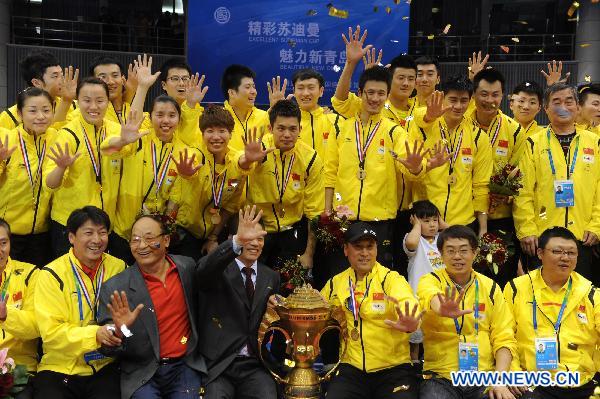China harvests in 'backyard' sports
 0 Comment(s)
0 Comment(s) Print
Print E-mail
Xinhua, December 31, 2011
E-mail
Xinhua, December 31, 2011
China is traditionally strong in sports like diving, table tennis and badminton, from which the world's most populous nation has reaped piles of international titles.
In the year of 2011, China still enjoyed a solid dominance in their backyard of sports, yet with challenges looming ahead of the London Olympics.
The "dream team" of Chinese divers topped the 14th FINA World Championships' diving medal tally in Shanghai this July, sweeping all 10 golds plus four silvers. It was the first time in history that Chinese divers swept the board at the worlds.
China bagged seven out of eight golds on offer at the 2008 Beijing Games, and took seven out of 10 at the 2009 Rome worlds. This time in Shanghai, the diving powerhouse finally achieved the ultimate glory.
The retirement of "diving queen" Guo Jingjing had little impact on the Chinese team, which was made up of both veterans and teenage talents and once again showed its undisputed domination in the sport.
In table tennis, Chinese clean-swept gold medals and women's singles quarterfinal spots in the Rotterdam World Championships this May.
Zhang Jike, 23, and Ding Ning, 21, beat more fancied teammates to win the men's and women's singles title, proving China is never short of new blood in the game.
![Zhang Jike beat Wang Hao to win men's singles title at the GAC GROUP World Table Tennis Championships in Rotterdam on Sunday 15th May.[Source: Sina.com] Zhang Jike beat Wang Hao to win men's singles title at the GAC GROUP World Table Tennis Championships in Rotterdam on Sunday 15th May.[Source: Sina.com]](http://images.china.cn/attachement/jpg/site1007/20111231/0013729928e61068a34701.jpg) |
|
Zhang Jike beat Wang Hao to win men's singles title at the GAC GROUP World Table Tennis Championships in Rotterdam on Sunday 15th May. [Source: Sina.com] |
In the six previous Olympic Games which featured table tennis, China swept the gold medals in 1996, 2000 and 2008. Moreover, Chinese paddlers also took everything on offer at the 2009 world championships.
Although the International Table Tennis Federation's decision to deduct one player each from the men's and women's singles events next year in London increased uncertainty for China, the stake to win all is still high with their vast reserve of talent.
The Chinese badminton team failed to complete a title sweep in 2011, but the shuttlers' sound performance still proved their tight grip of the game.
 |
|
Team members of China react during the awarding ceremony of the 2011 Sudirman Cup in Qingdao, east China's Shandong Province, May 29, 2011. China claimed the champion. (Xinhua/Li Ziheng) |
With the loss of the Uber Cup, the women's team top trophy, China made up with a fourth straight Thomas Cup victory in Kuala Lumpur in May.
The Chinese team went on to win all the five singles and doubles golds in the World Championships in Paris this August, repeating their title-sweeping feat 23 years ago.
However, with only seven months to go before the London Olympic Games, Chinese sports officials also see challenges amid the encouraging achievements in their own backyard.
"Generally speaking, we maintain our advantage in the sports that Chinese athletes traditionally excel in, but there is no much room for them to improve or win more gold medals in these sports," said Cai Jiadong, deputy secretary-general of the Chinese Olympic Committee (COC).
Thirty-nine out of 51 gold medals China won in the 2008 Olympics came from gymnastics, weightlifting, diving, shooting, table tennis, badminton and judo.
While China's specialty events continue to contribute medals to the Chinese delegation in London, it is unrealistic to expect Chinese athletes in these sports to be as good as in 2008.
For example, the Chinese gymnasts, who had snatched an amazing nine golds at the Beijing Games, slipped to a record of four golds, five silvers and three bronzes at this year's World Championships in Japan.
With the retirement of the "Diamond Generation" including Yang Wei, Huangxu and Li Xiaopeng, it will be a mission impossible for Chinese gymnasts to copy the 2008 glory.
"The competition of the London Games will be really tough. We are going to face stiff challenge," said head coach Huang Yubin.
Chinese weightlifters pocketed eight gold medals in Beijing, but in the World Championships in Paris last month, they only won six overall golds.
Chinese men's weightlifters competed in five categories and claimed four overall titles but their women's counterparts suffered a big setback, grabbing merely two overall golds out of seven categories they participated in.
"Although our men's team won four overall titles, the competition was very close," said Yang Binsheng, professor of the Beijing Sports University who also worked as a referee during the weightlifting worlds in Paris.
"For example, Zhang Jie won the 62-kilogram category but the runner-up from DPRK only trailed one kilogram. During the London Games, the competition may be even closer, and a small mistake may cost gold medal."
"And for the women's team, Chinese young lifters failed to deliver a satisfactory performance. They still need more training and experience before they can be relied on," Yang added.
China's judo team, who won three golds in Beijing, is also suffering from under-performance by their young athletes, with the reigning Olympic champion Tong Wen taking the only gold for China in this year's judo worlds.
"We know that we will meet tough challenge next year in London, but we will try our best to keep China in the leading positions on the overall medal standings," said Cai Jiadong.





